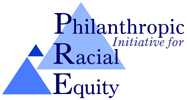
Catalytic Change: Lessons Learned from the Racial Justice Grantmaking Assessment


 PRE, together with the Applied Research Center (ARC), introduces the joint publication: Catalytic Change: Lessons Learned from the Racial Justice Grantmaking Assessment.
PRE, together with the Applied Research Center (ARC), introduces the joint publication: Catalytic Change: Lessons Learned from the Racial Justice Grantmaking Assessment.
This report shares the lessons learned from piloting a Racial Justice Grantmaking Assessment developed by the Applied Research Center (ARC) and the Philanthropic Initiative for Racial Equity (PRE) with two different foundations - the Consumer Health Foundation, a private foundation in Washington, DC; and the Barr Foundation, a family foundation in Boston, Massachusetts.
Please visit www.racialequity.org to download a full copy of the report and useful appendices. For more information about ARC, including timely racial analysis of economic and other issues, please visit www.arc.org.
PRE and ARC hope that this report will spark new catalytic changes within specific foundations and, over time, in the larger field of philanthropy.
In chemistry, catalyzers are often quite small in their initial scope, such as the introduction of minute amounts of new elements into an existing chemical combination or larger system. Such an introduction can either initiate the transformation of that compound, or speed up a transformation that is already underway. In our work, something as small as a new set of questions can generate a fresh perspective on existing frameworks. Engagement with these questions can reveal new possibilities and projects. The Racial Justice Grantmaking Assessment is a new set of questions applied to an old debate about the role of race in foundation giving. Through the process both the assessment team and the foundation participants learned that incremental steps - including asking a new set of questions - can help us all progress on racial disparities in the society (as well as within foundations).
Voices from Catalytic Change:
"The ARC - PRE assessment has
resulted in the foundation using a racial justice lens on our strategy
development for issues from the environment to education...It's
aligned us in the importance of being explicit in our communications.
We are significantly bolder in both policies and practices."
- Patricia Brandes, Executive Director, Barr Foundation
"When
tackling health inequities in communities of color, it is important to
look at the root issues of those inequities, and structural racism is
one of them. To look those issues in the eye, understand how they
affect what we're after in terms of improving life and health outcomes,
and to do so in a way that fully engages our board is exciting...It's
not easy. But if you want to lead, this is a great issue to lead on."
- Margaret O'Bryon, President and CEO, Consumer Health Foundation


